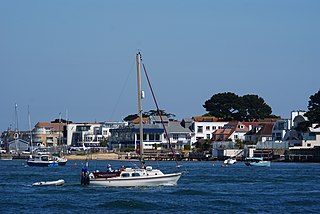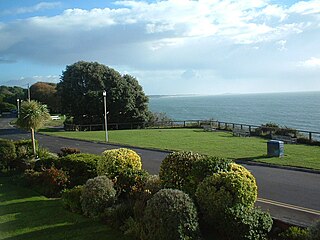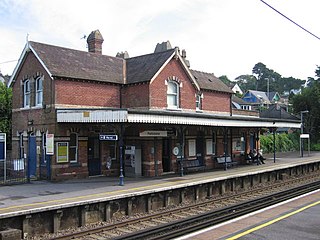
Poole is a coastal town and seaport on the south coast of England in the Bournemouth, Christchurch and Poole unitary authority area in Dorset, England. The town is 21 miles (34 km) east of Dorchester and adjoins Bournemouth to the east. Since 1 April 2019, the local authority is Bournemouth, Christchurch and Poole Council. The town had an estimated population of 151,500 making it the second-largest town in the ceremonial county of Dorset. Together with Bournemouth and Christchurch, the conurbation has a total population of nearly 400,000.

Brownsea Island is the largest of the islands in Poole Harbour in the county of Dorset, England. The island is owned by the National Trust with the northern half managed by the Dorset Wildlife Trust. Much of the island is open to the public and includes areas of woodland and heath with a wide variety of wildlife, together with cliff top views across Poole Harbour and the Isle of Purbeck.

Poole Harbour is a large natural harbour in Dorset, southern England, with the town of Poole on its shores. The harbour is a drowned valley (ria) formed at the end of the last ice age and is the estuary of several rivers, the largest being the Frome. The harbour has a long history of human settlement stretching to pre-Roman times. The harbour is extremely shallow, with one main dredged channel through the harbour, from the mouth to Holes Bay.

Sandbanks is an affluent neighbourhood of Poole, Dorset, on the south coast of England, situated on a narrow spit of around 1 km2 or 0.39 sq mi extending into the mouth of Poole Harbour.
Dorset Wildlife Trust (DWT) is a wildlife trust covering the county of Dorset, United Kingdom. The trust was founded in 1961 as Dorset Naturalists' Trust, to protect and conserve the wildlife and natural habitats of the county.

Mary Franeis Butts, also Mary Rodker by marriage, was an English modernist writer. Her work found recognition in literary magazines such as The Bookman and The Little Review, as well as from fellow modernists, T. S. Eliot, H.D. and Bryher. After her death, her works fell into obscurity until they began to be republished in the 1980s.

Poole is a constituency represented in the House of Commons of the UK Parliament since 2024 by Neil Duncan-Jordan, a Labour politician.

Penn Hill is a suburb and electoral ward of Poole in Dorset, England, bordering on Branksome Park, Canford Cliffs, Sandbanks, Lilliput and Parkstone. It is effectively part of Parkstone.

Branksome is a suburb of Poole, in the Bournemouth, Christchurch and Poole district, in the ceremonial county of Dorset, England. The area consists of residential properties and also a number of commercial and industrial areas.

Canford Cliffs is a suburb of Poole in Dorset, England. The neighbourhood lies on the English Channel coast midway between Poole and Bournemouth. To the southwest is Sandbanks which has some of the highest property values in the world; with Canford Cliffs it forms a parish which has the fourth highest property prices in the world and second highest in the United Kingdom after London.

Parkstone railway station serves the Parkstone area of Poole in Dorset, England.

Branksome Park is a suburb of Poole in Dorset, which adjoins Branksome, Dorset. The area covers approximately 360 acres (1.5 km2), mostly occupied by housing, and includes Branksome Chine which leads to the award-winning blue-flagged beaches of Poole.

Sandbanks Ferry is a vehicular chain ferry which crosses the entrance of Poole Harbour in the English county of Dorset. The route runs from Sandbanks to Studland and in doing so connects the coastal parts of the towns of Bournemouth and Poole with Swanage and the Isle of Purbeck. This avoids a 25-mile journey by road on a return trip.

Parkstone is an area of Poole, in the Bournemouth, Christchurch and Poole district, in the ceremonial county of Dorset, England. It is divided into 'Lower' and 'Upper' Parkstone. Upper Parkstone – "Up-on-'ill" as it used to be known in local parlance – is so-called because it is largely on higher ground slightly to the north of the lower-lying area of Lower Parkstone – "The Village" – which includes areas adjacent to Poole Harbour.
The history of Poole, a town in Dorset, England, can be traced back to the founding of a settlement around Poole Harbour during the Iron Age. The town now known as Poole was founded on a small peninsula to the north of the harbour. Poole experienced rapid growth as it became an important port following the Norman Conquest of England.

The Custom House is a Grade II* listed building in Poole, Dorset, England. It is a Georgian building located in the oldest part of Poole Quay, and is currently used as a restaurant.

Sea View is a suburb of Poole, Dorset. The area is anchored by Sea View Road, which links Parkstone towards Canford Cliffs and Sandbanks.


















